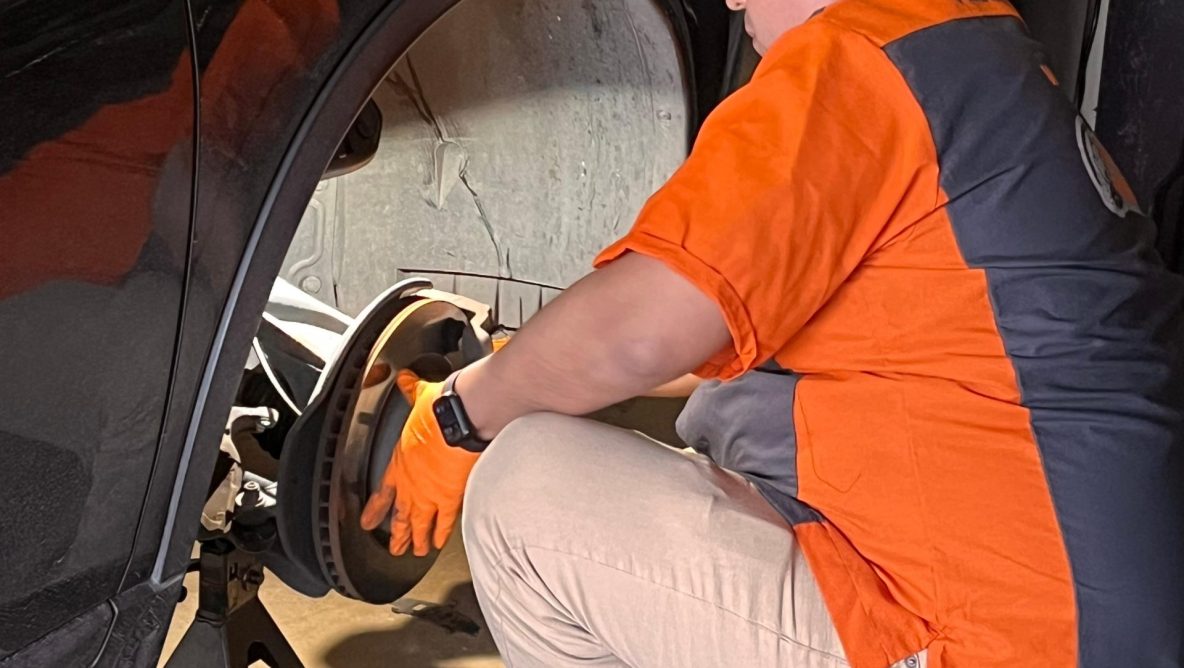3 Signs It's Time to Replace Your Brakes
Customers ask us, "Is it time to replace my brakes yet? It seems like it's been quite a long time since I replaced them." We've seen various blogs suggesting brakes should be replaced every 20,000, 50,000 or even 70,000 miles. While you can replace your brakes at certain mile markers as means of preventative maintenance, a more accurate answer might be that it depends on your driving.
Some people are more aggressive drivers. They tend to rev their engine to a max and stop at the very last second. You've seen 'em. And you know if it's you. These people are replacing everything on their car faster, not just their brakes—tires, brakes, rotors, oil, suspension and often their cars.
Other more passive drivers (often dubbed "Sunday Drivers") like to take it real slow and easy. They take the full 1/4 mile to get up to 35 mph and then take the next 1/4 mile letting the car ease down to 20 mph before applying their brakes. Yup, this driver may only replace their brakes once in a lifetime. They also likely only drive 20,000 miles over the 10 year life of the car too.
Cars will actually tell you when something needs to be replaced if you listen and know the warning signs. Sorry to be a bit religious here, but your car is a bit like the Holy Ghost. Yup, that's right. We just went there. It might be putting out the signs, but unless you know what to listen for, AND actually pay attention you may never hear it, until it's too late. And when it's too late, that still small voice becomes the loud crier of hard repentance. And, nobody wants that. It's costly and often requires more than just the basic fixes to get everything back to normal.
3 Indicators To Replace Your Brakes
1. A High Pitch Squeal. On the backside of your brakes there's often a metal stem that pokes out (not always). The purpose of this is to act as an early warning sign that the pads are wearing thin and it's time to get them replaced sooner than later. You'll hear this high pitch squeal as you tap on the brakes more than as a constant whine. If you let this go too long, you'll end up hearing more of a grinding noise. If you're hearing a hard grinding, or scraping, noise when braking than you've got a more urgent braking issue. We discussed this previously in How to Know When It's Time to Replace Your Rotors.
2. Softer Braking. There are 2 things that "softer braking" can mean. Let me explain this one. When you're brakes are new, you don't have to push on the brake pedal as hard, or rather the brakes engage sooner; the pedal doesn't go all the way to the floor before the brakes engage. If you find your brakes not engaging "as good as they used to" it's likely time to have someone check this out.
A bit off topic, but let's quickly explain the other "softer brakes" description. The second instance in which "softer braking" is used when you're brakes feel "hard" when you first step on the brake pedal, but then "soften" and then the pedal slowly falls to the floor rather than holding firm. This action forces you to pump the brakes to get the vehicle to stop. If this is sort of thing is happening it's likely the brake master cylinder has developed a leak or your brake boot is ruptured. In either instance, you'll want to have a qualified mechanic take a closer look and tell you exactly what needs to be done to fix the issue.
3. Longer stopping periods. If you find that it takes you longer to stop than normal, this could be because the pads are worn down. Sometimes you can look at the brakes through your rims and see them. If they look slim, replace them. If you're unsure, request a mechanic to come out and take a look.
Back brakes are a bit more hard for people to tell. And it's good to have them looked at when replacing the front brakes. Knowing when to replace the back brakes while driving may take a bit more of a refined sense of car whispering, or being in-tune with your car. The best way to describe when your back brakes may need to be replaced is if the car doesn't "sit" when you brake. Here's what I mean. While your front brakes take the brunt of the work, your back brakes actually work in tandem to maximize stopping power. When braking the back brakes engage also, but they only apply just enough pressure to pull the vehicle back as you stop. The result is a "sit." Under normal braking instances (not emergency or hard braking instances) if the car feels like your being thrown forward while braking —then it's possibly time to have your back brakes looked at as well.
Please Note: It is always best practice to replace your rotors with each brake job so that your brakes and rotors seat properly. If you opt to replace your brakes without replacing your rotors, this voids brake warranties against noise and drivability.


